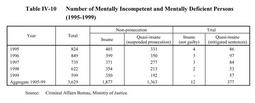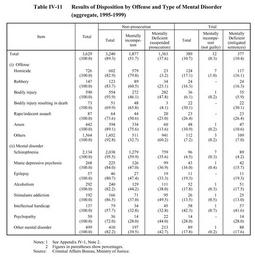| Previous Next Index Image Index Year Selection | |
|
|
2 Criminal disposition of mentally incompetent and mentally deficient persons Table IV-10 shows the number of persons who received dispositions of non-prosecution due to derangement resulting from mental disorder or suspended prosecution due to weak-mindedness by public prosecutors offices, as well as those who received adjudications of not guilty due to mental incompetency or received reduced sentences due to mental deficiency by first instance courts. In the five-year period from1995to1999,a total of3,629persons received such dispositions or adjudications. (For the purpose of this chapter, these3,629persons are referred to as"mentally disordered offenders". )
Table IV-11 shows the reasons for non-prosecution and the results of trials for mentally disordered offenders, by offense and type of mental disorder. By offense, mentally disordered persons most frequently committed homicide(20.0%), followed by bodily injury(16.3%). As for the1,889non-prosecuted suspects who were deemed deranged or found not guilty due to derangement by first instance courts, homicide was the most frequently committed offense, accounting for31.0%of the total, followed by arson with17.7%. Table IV-10 Number of Mentally Incompetent and Mentally Deficient Persons (1995-1999) Table IV-11 Results of Disposition by Offense and Type of Mental Disorder (aggregate,1995-1999) |

